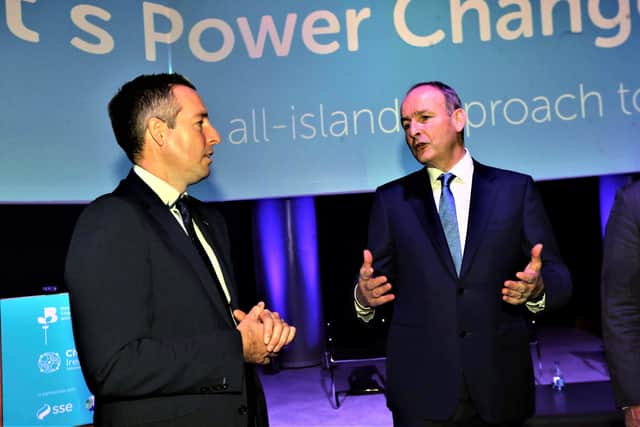Ruth Dudley Edwards: The pro united Ireland activists live in never-never land


However, this proved to be a delusional headline imposed by a sub-editor on an article by the reliable political editor, Pat Leahy, which began: “A large majority of voters favour a united Ireland in the long term, but are opposed to a new national flag, a new national anthem, paying higher taxes or curtailing public spending to facilitate it, the latest Irish Times/IpsosMRBI poll has found.”
Polls usually ask simple questions, but like the RedC poll that I wrote about briefly last week, this one searched for the reality beyond the pious words.
Advertisement
Hide AdAdvertisement
Hide AdRedC had found that if a referendum was held today in the Republic, 60% would vote for a united Ireland, but this fell to 41% if it meant increased taxes.


“To support a united Ireland”, only 35% would be willing to replace the national anthem and 27% to replace the flag and, only 23% would rejoin the Commonwealth — an organisation Irish people seem to think means being under the boot of British imperialism rather than an equal in an association of 54 independent countries improving trade and sporting relationships.
Just 39% “would support guaranteed unionist cabinet positions in a united Ireland government”, despite the Republic being long used to coalitions.
The Irish Times/Ipsos poll figures on anthem, flag and Commonwealth and unionists in government were very similar to RedC’s, sounding, observed Leahy, “less like a new shared country than assimilation into the existing one”.
Advertisement
Hide AdAdvertisement
Hide AdIt showed only 15% prepared to accept higher taxes and 13% lower spending on public services.
What I found most fascinating were the responses to “How important is a united Ireland to you?”
“Very important, it is a priority for me”, said 20%,
“Not very important, but I would like to see it someday”, 52%,
“Not at all important,” 24%, and 4% didn’t know.
What’s more, only 36% of Sinn Fein regarded unity as “very important” and a “priority”. What will the boys pulling the Sinn Fein strings in Connolly House think about that? Will any of them ever grasp that the IRA turned most of Ireland off unity.
Advertisement
Hide AdAdvertisement
Hide AdHaving been brainwashed for a century about their aspiration to regain the “fourth green field”, and told that they were unpatriotic if they didn’t want an end to partition, the majority in the Republic chose a quiet life by nodding along to the traditional mantra.
Sinn Fein are adept in twisting poll findings and they and their friends have been bullying unionists relentlessly with demands that they address the inevitable by participating in discussions about what kind of new Ireland they wanted.
But what is inevitable about a united Ireland? As a Dublin friend said to me the other day, “Look, with all its faults, I’m happy with the country we’ve created since independence, and I don’t want it threatened. I’m a partitionist.”
Few people admit to that, but it’s what these polls reveal.
Advertisement
Hide AdAdvertisement
Hide AdAs Pat Leahy summarised it caustically: “So, you want a united Ireland? Of course. Soon? Eh, not really. Want to pay for it? Nope. Want unionists involved? Sure. Want to change the anthem or the flag? Not a chance. How much do you really care about it? Let me get back to you on that.”
That particular nationalist dream is over.
Electors in the south are favouring Sinn Fein not because of posturing about unity, but because they’re desperate for a government to sort out housing and the cost of living. Voters are going left, not green, which is why Sinn Fein have changed their clothes and are claiming economic competence rather than playing war drums.
Southerners dislike Nordies of all kinds and are happy with partition, even if they won’t admit it.
The disgusting Gerry Adams Christmas video that has now been withdrawn by its publishers will amuse very few. He’s an embarrassing old man in need of a barber who is living in a past the Republic doesn’t want to know about.
Advertisement
Hide AdAdvertisement
Hide AdIt’s time unionists stopped allowing themselves to be spooked with warnings about a united Ireland being imposed by force or stealth. It’s ain’t going to happen.
Their leaders should get on with sorting out the problems of the protocol, and working cooperatively with those Irish politicians like Michéal Martin who want a peaceful and prosperous island, and not get distracted by the siren calls from the likes of Ireland’s Future.
They’re living in never-never land. A referendum is decades away.
As Doug Beattie has said plainly : “I think it is really unreasonable for anyone to think I as a unionist should help with the architecture around the argument for a united Ireland by engaging in it.
Advertisement
Hide AdAdvertisement
Hide Ad“I don’t need to. Where we get to the stage where we have to do this, we will engage in order to put our point across for staying in the UK.”
Which, as Lord Ashcroft’s new poll has confirmed, is what a majority of Northern Ireland voters wish to do.
l Ruth Dudley Edwards is the author of ‘The Faithful Tribe: an intimate portrait of the loyal institutions’
——— ———
A message from the Editor:
Thank you for reading this story on our website. While I have your attention, I also have an important request to make of you.
Advertisement
Hide AdAdvertisement
Hide AdWith the coronavirus lockdowns having had a major impact on many of our advertisers — and consequently the revenue we receive — we are more reliant than ever on you taking out a digital subscription.
Subscribe to newsletter.co.uk and enjoy unlimited access to the best Northern Ireland and UK news and information online and on our app. With a digital subscription, you can read more than 5 articles, see fewer ads, enjoy faster load times, and get access to exclusive newsletters and content.
Visit
now to sign up.
Our journalism costs money and we rely on advertising, print and digital revenues to help to support them. By supporting us, we are able to support you in providing trusted, fact-checked content for this website.
Ben Lowry, Editor